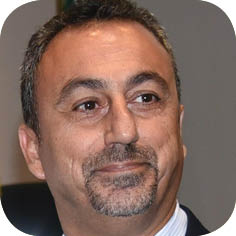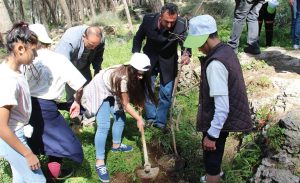Olive trees are a symbol of steadfastness, peace, and resistance. For hundreds of years, olives have been an important part of Palestinian life, culture, and economy. The olive harvest season is an important time of year for Palestinian culture and heritage. Attacks on olive trees and attempts by the Israeli occupation to hinder or prevent harvests have become common. More than one million olive trees have been uprooted during the past decade due to the expansion of the occupation.
In 2001, the Environmental Education Center (EEC) launched an original initiative – the first Olive Harvest Festival – in an attempt to combat attacks on olive trees and bring the community together to celebrate this important season. The festival celebrates Palestinian heritage and culture, promotes sustainable environmental practices, and supports local farmers and women’s agriculture societies. Students participate in Palestinian culture and volunteer work, helping local farmers and engaging in traditional dabka dance, musical performances, and poetry readings alongside a market of fair-trade, local, and organic products such as olive oil, wood, soap, and handicrafts. EEC partners with the Peace Center/Bethlehem Municipality and national institutions such as the Ministry of Agriculture and the Chamber of Industry and Commerce to host the festival, which has now become so popular throughout Palestine that many other Palestinian organizations have adopted it. EEC works all year to support planting, environmental growth, and education. The continued commitment of the prime minister, the ministers, and ministries to the festival reflects their dedication to protecting and promoting a green Palestine. Each year, the Olive Harvest Festival revives culture and creates a sense of pride in Palestinian heritage, history, and environment.
A Tree for Every Student
A national initiative called “A Tree for Every Student” was adopted in 2006 by the minister of agriculture and all relevant institutions (the Ministry of Education, the Ministry of Local Government, the Environment Quality Authority, and others), which formed a committee to plant more trees and create a greener Palestine.
The aim of this initiative is to raise students’ awareness about planting trees and encourage them to understand their crucial role in greening Palestine and protecting trees. When students are involved in planting, they create an emotional connection to the land and strengthen their Palestinian identity. Campaigns are supplemented with information about the importance of trees for Palestine and the mitigation of climate change globally. Creating environmental connections among young people supports a sustainable future and a capacity for future development.
The Environmental Education Center, EEC, has launched tens of planting campaigns during the past 20 years through which tens of thousands of trees have been planted in the West Bank. The campaigns give hope to people, especially farmers, and encourage them to keep planting despite the illegal and brutal actions against them.
EEC is working to continuously grow the initiative. A tree nursery was developed in Ramallah to produce native trees as a way not only to green Palestine but also to preserve natural heritage and increase vegetation.




